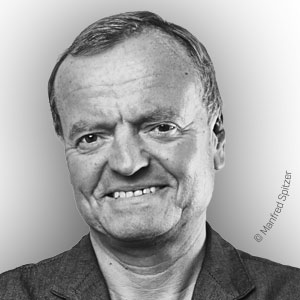2 Days / 11 Talks / 4 Workshops
Top speakers from health care,
nursing care and the community

Manfred Spitzer
Manfred Spitzer has been the Medical Director of the Psychiatric University Hospital in Ulm since 1997.
Digital media is an essential part of the working world especially in the field of technology, according to Spitzer, who also believes it is also unfortunately extremely addictive and results in long-term damage to the body (through stress, insomnia or obesity) and especially the mind.
The brain (i.e. the approx. billions of neural pathways generated between neural cells) generally only develops after use: every single observation, thought, feeling, experience, decision and action changes its make-up. This is regarded as one of the most significant findings in neuroscience of the latest decades. The opposite is also true: memory pathways will start to deteriorate and break down completely, when they are underused. Decreased activity causes the brain to shrink. In addition, chronic stress leads to the downfall of neural cells.
Digital dementia presents itself as the increasing inability to maintain orientation and its consequences are wide-ranging: social deprivation and isolation, depression and a much earlier death. So what can and should be done to prevent this? It cannot mean doing away with digital media in the fields of technology or science, because it is only in knowing the risks and side-effects that digital media can be used responsibly and sustainably in the long-term.
Short Biography of Speaker
- Medical Director of the Psychiatric University Hospital, Ulm since 1997
- previously Senior Doctor at the Psychiatric University Hospital in Heidelberg
- 2004: Foundation of the Transfer Centre for Neurosciences and Learning (ZNL)
- Author of numerous best-sellers

